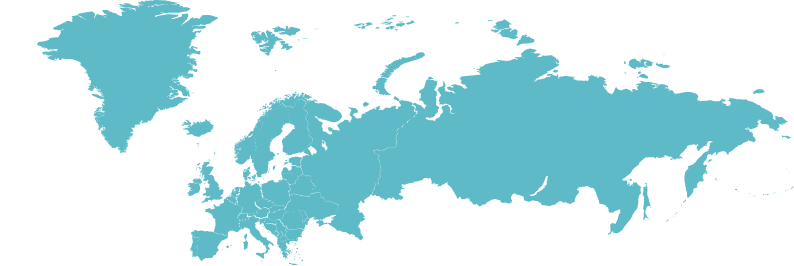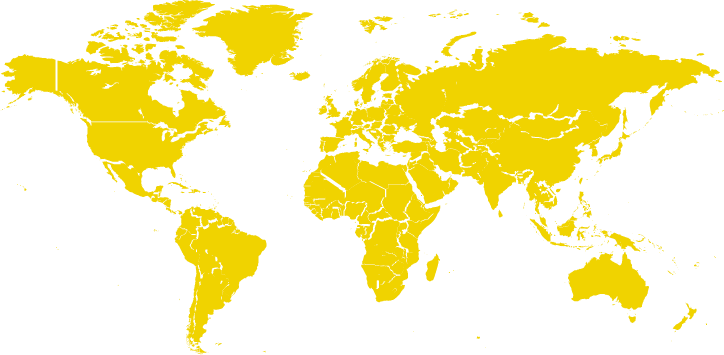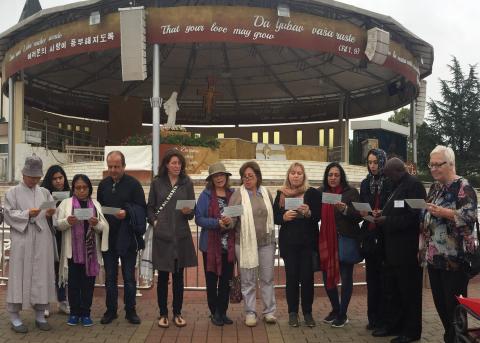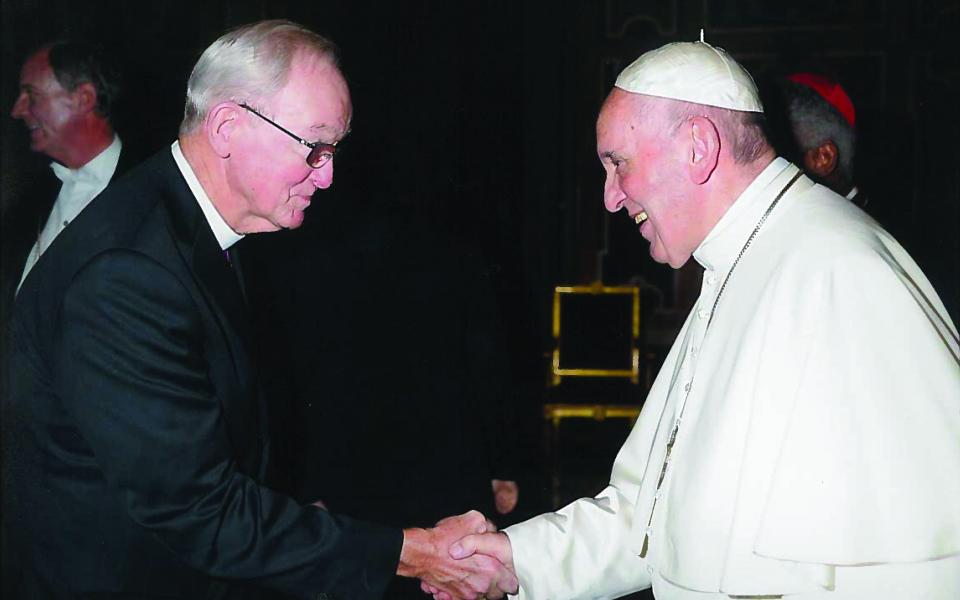
Pope Francis and Bishop Swing shake hands.
November 8 to 11, 2017
This trip came out of the blue. At the October meeting of Voices for a World Free of Nuclear Weapons, Jonathan Granoff mentioned that he was going to attend a nuclear conference at the Vatican, called by Pope Francis, next month. Monica piped up and said that I ought to attend as well and that she would talk with Maria Crespo in Argentina. I thought nothing of this off-handed comment and went on chairing our meeting.
Then at breakfast on Wednesday, November 8, I checked my email. There was an urgent message from Maria. She indeed had gotten in touch with her old friend, Father Padacchio, who is now the Secretary of Pope Francis. He, on behalf of the Pope, extended an invitation to me. With no airline ticket, nowhere to stay, and with only 36 hours before the conference opened, I decided to go. Why?
1) I figured it would be URI’s one chance to further our relationship with the Pope; 2) I had a lot to learn and a tiny bit to contribute to a nuclear abolition conference; and 3) I would have an opportunity to promote URI on a big stage. My only trepidation was concern for how this 81 year old body would hold up to the immediate tension of travel details, the long miles, and the jet lag that would follow especially with a big book signing event at the beginning of next week at the home of George and Charlotte Shultz.
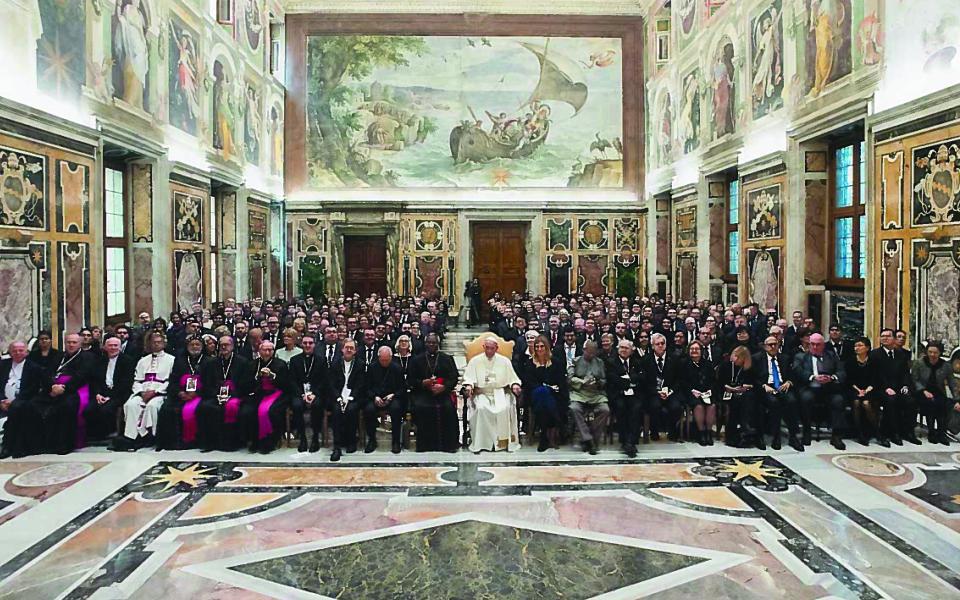
Bishop Swing with the group at the Vatican
Following Maria’s advice, I telephoned Alessandra Silvi at the Vatican who told me that one person who was to stay at the Michelangelo Hotel had just that minute canceled. I called the hotel and got the room. Then I called Stefan at the URI office, and he set up a flight that called for me to be at the airport in three hours. I rushed to the shopping center to get a gift for the Shultzes, watered the flowers on the porch, packed and got to the airport on time. Only I forgot to bring my passport. Mary bailed me out with a wild cab ride while clutching my passport.
The subject of nuclear weapons and the existential threat they pose was palpable.
The subject of nuclear weapons and the existential threat they pose was palpable. The President of the United States and the President of North Korea were exchanging bellicose, juvenile and totally irresponsible remarks about bombing each other’s country. On the other hand, in July, 125 countries at the United Nations had committed to rid the world of nuclear weapons. The Nobel Peace Prize Committee singled out the International Campaign of Abolish Nuclear Weapons (ICAN) to be this year’s honoree. I am sure that the Committee wanted to focus on nuclear matters at this precarious moment.
At this critical moment in history when most people fear what the President might do with these weapons at his fingertips, it is slightly comforting to know that the person next to him at the top of the decision chain has a prayer.
And . . . a few weeks ago, I had sent a letter to my friend and colleague at Stanford, General James Mattis, Secretary of Defense of the United States, and in the letter I included the Nuclear Prayer which we say each month at the meetings of the Voices for a World Free of Nuclear Weapons. Jim then sent me back a personal, handwritten letter saying that our prayer now sits in the middle of his desk. At this critical moment in history when most people fear what the President might do with these weapons at his fingertips, it is slightly comforting to know that the person next to him at the top of the decision chain has a prayer. By the way, we members of Voices made a YouTube video of us saying that prayer, and it turned out to be of great interest to lots of people in Rome.
When a former Secretary of State, a former Secretary of Defense, several United States Ambassadors, a famous physicist, and a few friends pray each month for the elimination of nuclear weapons, it raises lots of questions. What do they know that everyone needs to know? Why are they praying? What is their prayer?
On Friday morning, November 10, I walked down to the hotel desk and picked up an official badge for the conference and then walked over to St. Peter’s and the Swiss Guards wondering what they would make of an unnamed badge guy. Seeing my purple shirt and clerical collar, they clicked their heels together, saluted and I walked in. By the way, the name of the conference was “Perspectives for a World Free From Nuclear Weapons and For Integral Disarmament.” It was organized by the Dicastery for Promoting Integral Human Development. (In my days of hanging around the Vatican, such a word as “Discastery” wasn’t in vogue. To me it sounds like a medical procedure that produces eunuchs.)
There were scholars, Nobel Peace Prize winners, scientists, politicians, many impressive layers of Catholic peace activists, veteran diplomats who have worked on nuclear negotiations, a handful of representatives of other religions, and one person from the interfaith world….me. I walked in knowing only one person and sidled up to lots of people to strike up conversations. Actually this exercise turned out to be fun. Two examples: Larry Korb who has held deeply responsible jobs in our government and the Ambassador from Montenegro, Miodrag Vlahovic, where Mary and I visited two months ago.
After I got my bearings, I actually knew quite a few. First of all, there was Jonathan Granoff. But there were several Catholic bishops of North American that I had worked with at Stanford. Others from the World Council of Churches! But best of all, by far, was seeing Monica Attia. Many years ago, when Mary and I first went to a Saint Egidio event in Rome, we were picked up, shepherded and guided by a young member of the St. Egidio (Lay Order) named Monica Attia. And now here she was all grown up speaking to this august assembly about her amazing work with refugees. She and her folks fly to counties where people are fleeing, interview and vet refugees, then fly them to Italy, help them apply for asylum status, and stay with them long term so they are in advantageous settings.
Oh, I have to mention, Rose Gottemoeller, as well. She was the United States’ lead negotiator for the last SALT Talks Agreement with the Russians. Now she is in charge of the nuclear issues with NATO. Having worked with former Secretary of State, George Shultz, Sid Drell, Bill Perry and others on nuclear matters at Stanford over the years, I have had the privilege of getting to know some very special people. Rose is one of them. Seeing her was like old home-week, and we fondly remembered Sid who had died this year.
The highlight of the conference happened on the first morning. Pope Francis welcomed us at an official Papal audience, and he spoke these monumental words: “Nor can we fail to be genuinely concerned by the catastrophic humanitarian and environmental effects of any employment of nuclear devices. If we also take into account the risk of an accidental detonation as a result of error of any kind, the threat of their use, as well as their very possession, is to be firmly condemned.” Condemnation! In the past, the Papacy has given some license for nuclear weapons under special circumstances. Now he condemns them outright and the possession of them. He further states, “International relations cannot be held captive to military force, mutual intimidation, and the parading of stockpiles of arms . . . They cannot constitute the basis for peaceful coexistence between members of the human family, which must rather be inspired by the ethics of solidarity.”
"[Nuclear weapons] cannot constitute the basis for peaceful coexistence between members of the human family, which must rather be inspired by the ethics of solidarity.” - Pope Francis
He is not judging nuclear weapons; he is condemning them. This call will reverberate, not only to Catholics, but to all people, especially the nine nuclear countries who rely on the “fake security” of these weapons. Also, it is important to note that his north star for the humanity is “an ethics of solidarity.” I think he is saying that the final measuring rod is not the Church but how all human beings together strive for solidary. (That is where the URI could come in as an example of an ethic of solidarity among diverse people.)
On a far lesser scale of importance, Pope Francis invited all 350 of us to come forward, one at a time, to look him in the eye, shake hands with him, standing up, not kneeling down and kissing his ring. It was such a radical departure from the past and so very human and moving. This took a long time, but he was genuinely engaged with everyone. While he and I were holding hands, I wanted to say “Blessings.” But how cheeky would that be for me to bless a Pope? So I hit the mute button.
I brought a packet of URI material, attached a note to it and gave it to Father Padacchio to give to the Pope. I reminded him our time together in Buenos Aires in 2007 with Rabbi Arieh Sztokman, Sheik Beytullah Cholack, Swami Pareshananda, Indigenous Leader Raul Mamani, and María Eugenia Crespo. I hope that he glances at it.
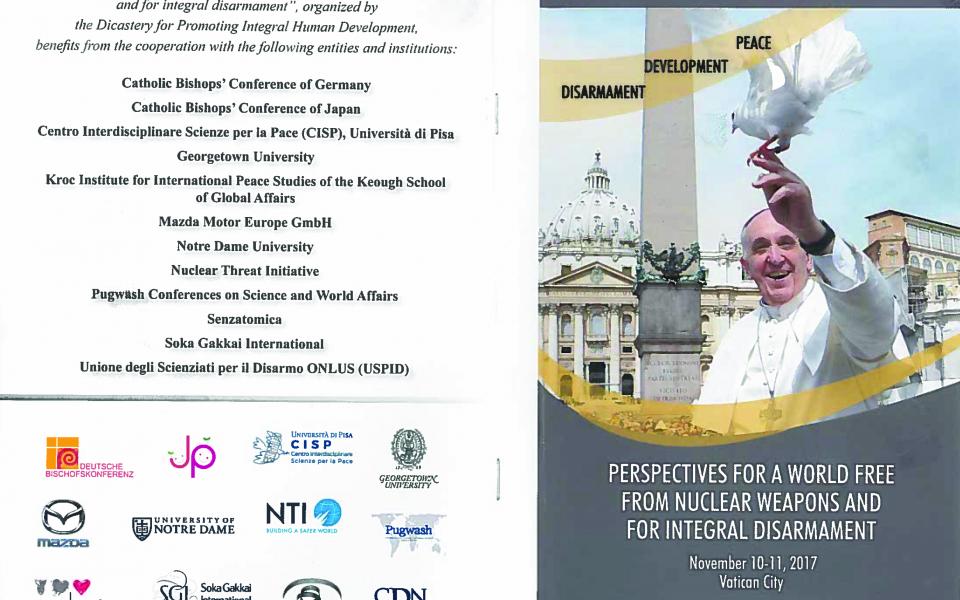
FOOD
I had two highlights. First, the grand one was going to the official residence of the Italian Ambassador, Pietro Sebastiani, to the Holy See. (Yes, Italy has an Ambassador’s residence for this little Roman enclave, and it is located at Viale della Belle Arti, 2.) It was both ancient and over-the-top in elegance. Only a small number of us were invited, and I owe my thanks again to Alessandra . . . who was always coming through for me. At dinner, I sat with the big guy, Cardinal Peter Turkson who is in charge of this conference. Really a gracious and funny man! And I sat with Alexei Georgevich Arbatov and his wife, a scholar. They are great friends with Bill Perry, former Secretary of Defense and a member of our Voices group. He will be visiting them in Russia next month. Also I conspired with Ted Turner’s daughter, Laura, about getting together all of the little nuclear abolition groups and do funding raising for them together. Evidently, this is Warren Buffet’s key concern, but no one has presented a convincing case to him.
Alas, I got into a good natured debate afterwards with Dr. Francois Bugnion, the Head of Red Cross International (He had good things to say about our friend, Admiral Marty Evans, who was the Head of Red Cross in the USA and was let go although she had done a great job.) Francois and I debated about the Council of Trent, and the next day, I discovered that he was entirely correct. I avoided eye contact.
The second food detail was that I had two nights to eat by myself. So I did what Mary and I often do in Rome, i.e. go to the nearest dumpy little neighbor café and eat the “specialita.” I went to a place that was so neglected that I was the only customer. I ate like a king and had lovely conversations with the owner and her teenage son, my waiter.
SPEAKERS
The core of the conference was devoted to designated people speaking. But I was pleasantly surprised to see Cardinal Peter Turkson open or end sessions by asking the audience to comment. Some of those comments turned out to be highlights. 1) Of the Roman Catholic hierarches, I was most impressed by Cardinal Pietro Parolin because he is second in command in Rome, by Monsignor Paul Richard Gallagher because he was so erudite, clever and handsome, and the Bishop of San Diego, Robert W. McElroy, because I served with him in San Francisco a long time ago and because he gave such a thoughtful, insightful speech.
2) Excitable speakers, and first among them was Nobel Peace Prize winner, Jody Williams. She took out after any target in sight including the Roman Catholic Church……as did the fiery Mairead Corrigan-Maguire of Ireland. No one slept when these ladies lit into their subjects. Then there was Emily Landau, from Jerusalem, who gave an impassioned defense of Israel’s plight. I had a grand conversation with her the night before and she made a good argument. But the response was tepid. I think that the plight of the Palestinians alternately hung in the room’s air.
3) The quiet speakers! First among those was a Japanese lady, Masako Wadawho lived through the atomic bombing of Nagasaki. A hush of deep empathy fell over the crowd as she gently described the horrors. Then there was Marie-Noelle Koyara was is the world’s only female Secretary of Defense, in the impossibly troubled Republic of Central Africa. Finally there was Izumi Nakamitsu whose task was to get us to focus on the need for disarmament of all sorts, e.g. illegal arms trafficking, disproportionate scale of monies going to “security” and instead of going to build up civil society, etc.
4) All around speakers with lots of substance. The three that stuck for me were Muhammad Yunus of Grameen Bank fame and Mohamed El Baradei who headed up the International Atomic Energy Agency and Suzi Snyder, Director of the Nuclear Disarmament Program, PAX. Suzi’s group buttonholed the politicians to pass this summer’s UN statement of disarmament. An Italian politician stood up and testified to what a difference Suzi had made in Italy.
5) Really dull or predicable with no substance speakers! Do you really think that I will name names?
STUDENTS
What impressed me most was how many, how bright and how committed the students were. They were Roman Catholic college students from Georgetown, Notre Dame, Catholic University in D.C. and students from Rome. I chatted with two young ladies who are studying theology. One wants to become a Canon Lawyer although she would be a priest in a heartbeat if it were available to her (she also has a vocation of praying for young priests who are starting out) and the other wants to teach at the university level.
I sat at lunch with two students from Lebanon and one from Georgia (middle Europe). They were involved in conflict resolution projects and had a profound sense that their faith is leading them into reconciliation work.
THE END
Stefan couldn’t find me an easy flight home, so I got up at 4:00 a.m. on Sunday, flew to Istanbul, and caught a fourteen-hour flight to SFO. I am I glad I went to Rome. Absolutely! Did I do a good job of promoting URI? Yes, I found all sorts of people of all ages, genuinely interested. Did we all raise the fire around nuclear weapons? I sincerely hope so. Pope Francis certainly took his best shot.
